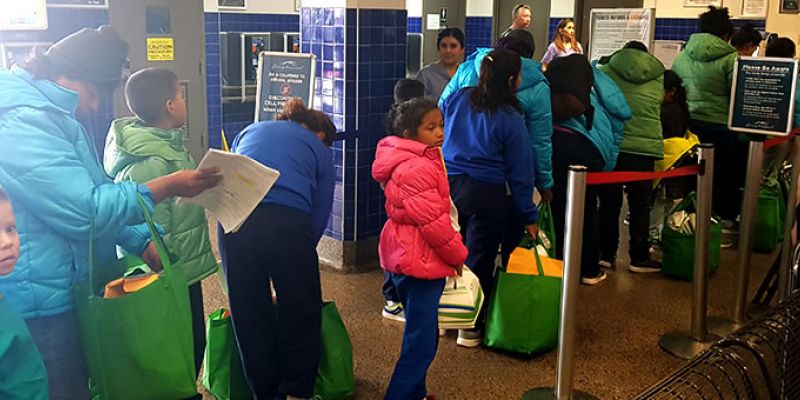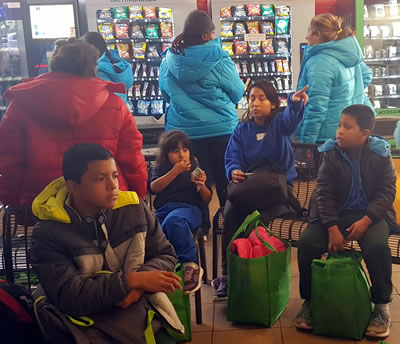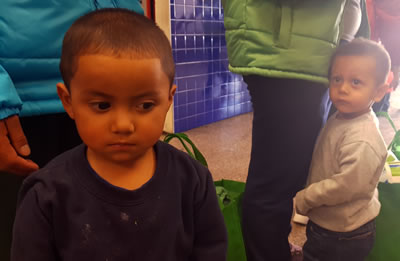
 One of the striking aspects of spending four months in San Antonio, Texas, is the very Hispanic/Mexican feel of the city as well as the way it manages its social challenges, just as homelessness, poverty and more recently, the daily appearance (at its bus stations and airport) of Central American migrants who have been released “on cognizance’’ from nearby border detention centers. These people are often deposited at transport centers with little more than their children, the clothes they are wearing, and – if they are lucky – a paid Greyhound ticket to the destination of the relatives who have sponsored them, and in whose city they will have to appear for a definitive court ruling on their future.
One of the striking aspects of spending four months in San Antonio, Texas, is the very Hispanic/Mexican feel of the city as well as the way it manages its social challenges, just as homelessness, poverty and more recently, the daily appearance (at its bus stations and airport) of Central American migrants who have been released “on cognizance’’ from nearby border detention centers. These people are often deposited at transport centers with little more than their children, the clothes they are wearing, and – if they are lucky – a paid Greyhound ticket to the destination of the relatives who have sponsored them, and in whose city they will have to appear for a definitive court ruling on their future.
One day, as I myself was waiting for a bus, I noticed a group of volunteers called the “San Antonio Interfaith Welcome Coalition” shepherding asylum seekers to a safe area within the station, and doing their best to explain, and sometimes pay for, their onward journeys, as well as provide them with food, medicine and clothing. I was impressed and approached one, a religious Sister, asking her if I could volunteer some time. Her only question to me was, “Can you speak some Spanish?” Hearing that I could, she mentored me on the spot about how to summarize a concertina of Greyhound tickets into a simple itinerary for each migrant – how many buses they will board, in what cities, with what waiting times and when they will reach their final destination whether it is New Orleans or New Jersey. This is an easy, but very appreciated, service to migrants who otherwise have no idea where they are going, how long it will take, and when they will arrive.
 Migration and asylum rights is a very complicated and tortuously political issue, which I do not claim to fully understand. What I have experienced is multiple encounters with gentle people who are often bearing the signs of trauma. Occasionally I ask about their journey through Mexico, to be met either with a silent gaze, or else stories of hunger, fear and confusion. One senses that what these folk have left behind must have been really bad in order to embark on such a journey. I have heard tales of countries having had no rain or crops for three years, women given a choice of either becoming a drug mule or being raped, as well as kids who ask me if I can find them a used “American toy” or crayons.
Migration and asylum rights is a very complicated and tortuously political issue, which I do not claim to fully understand. What I have experienced is multiple encounters with gentle people who are often bearing the signs of trauma. Occasionally I ask about their journey through Mexico, to be met either with a silent gaze, or else stories of hunger, fear and confusion. One senses that what these folk have left behind must have been really bad in order to embark on such a journey. I have heard tales of countries having had no rain or crops for three years, women given a choice of either becoming a drug mule or being raped, as well as kids who ask me if I can find them a used “American toy” or crayons.
I salute the City of San Antonio, which on its own budget, opened a resource center and clinic for sick migrants – almost all of these nurses, social workers and translators are volunteers; the nearby Travis Methodist Church which provides backpacks, showers and a bed for migrants who otherwise would have to sleep on the station floor; Greyhound staff who go way beyond their duties guiding migrants to the right buses and multiple other passengers who spontaneously buy milk for the children, sweep the floor , and offer words of welcome to the United States . At times like this I appreciate what a great nation America truly already is.
Columban Fr. Patrick Colgan spent several months in 2019 Texas on sabbatical. He is now living and working in Fiji with Columban seminarians.


 The Columbans are a society of missionaries, including priests and lay people, who minister to people of various cultures as a way of witnessing to the universal love of God.
The Columbans are a society of missionaries, including priests and lay people, who minister to people of various cultures as a way of witnessing to the universal love of God.